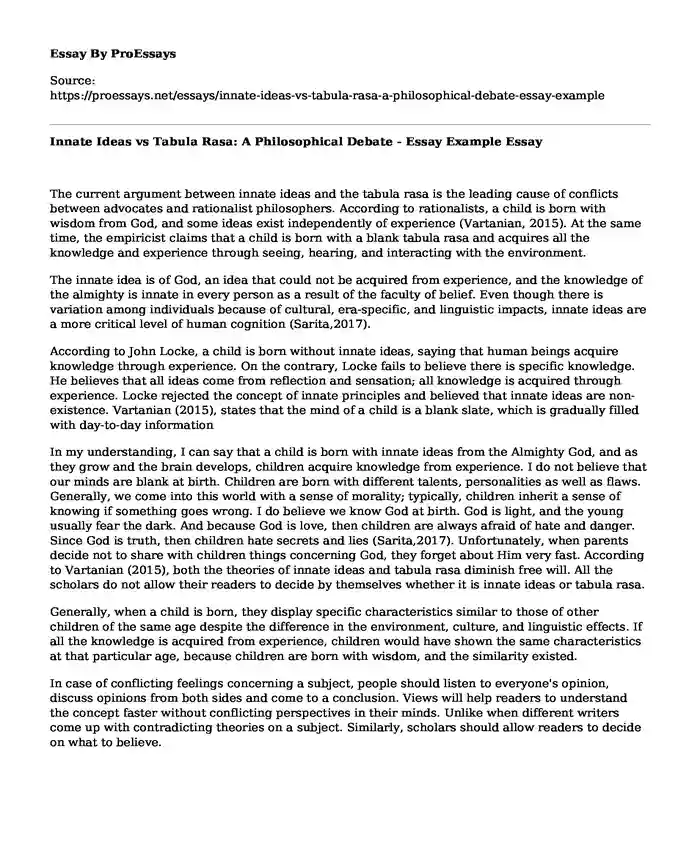The current argument between innate ideas and the tabula rasa is the leading cause of conflicts between advocates and rationalist philosophers. According to rationalists, a child is born with wisdom from God, and some ideas exist independently of experience (Vartanian, 2015). At the same time, the empiricist claims that a child is born with a blank tabula rasa and acquires all the knowledge and experience through seeing, hearing, and interacting with the environment.
The innate idea is of God, an idea that could not be acquired from experience, and the knowledge of the almighty is innate in every person as a result of the faculty of belief. Even though there is variation among individuals because of cultural, era-specific, and linguistic impacts, innate ideas are a more critical level of human cognition (Sarita,2017).
According to John Locke, a child is born without innate ideas, saying that human beings acquire knowledge through experience. On the contrary, Locke fails to believe there is specific knowledge. He believes that all ideas come from reflection and sensation; all knowledge is acquired through experience. Locke rejected the concept of innate principles and believed that innate ideas are non-existence. Vartanian (2015), states that the mind of a child is a blank slate, which is gradually filled with day-to-day information
In my understanding, I can say that a child is born with innate ideas from the Almighty God, and as they grow and the brain develops, children acquire knowledge from experience. I do not believe that our minds are blank at birth. Children are born with different talents, personalities as well as flaws. Generally, we come into this world with a sense of morality; typically, children inherit a sense of knowing if something goes wrong. I do believe we know God at birth. God is light, and the young usually fear the dark. And because God is love, then children are always afraid of hate and danger. Since God is truth, then children hate secrets and lies (Sarita,2017). Unfortunately, when parents decide not to share with children things concerning God, they forget about Him very fast. According to Vartanian (2015), both the theories of innate ideas and tabula rasa diminish free will. All the scholars do not allow their readers to decide by themselves whether it is innate ideas or tabula rasa.
Generally, when a child is born, they display specific characteristics similar to those of other children of the same age despite the difference in the environment, culture, and linguistic effects. If all the knowledge is acquired from experience, children would have shown the same characteristics at that particular age, because children are born with wisdom, and the similarity existed.
In case of conflicting feelings concerning a subject, people should listen to everyone's opinion, discuss opinions from both sides and come to a conclusion. Views will help readers to understand the concept faster without conflicting perspectives in their minds. Unlike when different writers come up with contradicting theories on a subject. Similarly, scholars should allow readers to decide on what to believe.
Conclusion
The current argument between innate ideas and the tabula rasa is the leading cause of conflicts between advocates and rationalist philosophers. The original idea is of God, an idea that could not be acquired from experience. The knowledge of the almighty is innate in every person as a result of the faculty of belief. Even though there is variation among individuals because of cultural, era-specific, and linguistic impacts, innate ideas are, therefore, a more critical level of human cognition.
References
Sarita, P. (2017). Constructivism: A new paradigm in teaching and learning. International Journal of Academic Research and Development, 2(4), 183-186. https://www.researchgate.net/profile/Poonam_Gupta33/publication/322977527_Constructivism_A_new_paradigm_in_teaching_and_learning/links/5b407135458515f71cad334e/Constructivism-A-new-paradigm-in-teaching-and-learning.pdf
Vartanian, A. (2015). Diderot and Descartes. Princeton University Press. https://books.google.co.ke/books?hl=en&lr=&id=sCvWCgAAQBAJ&oi=fnd&pg=PP6&dq=Descartes+on+innate+ideas&ots=wCz21GRtIO&sig=Vg8OlAsBlEP9FiEq3wpiLpKoi3s&redir_esc=y#v=onepage&q=Descartes%20on%20innate%20ideas&f=false
Cite this page
Innate Ideas vs Tabula Rasa: A Philosophical Debate - Essay Example. (2023, Nov 18). Retrieved from https://proessays.net/essays/innate-ideas-vs-tabula-rasa-a-philosophical-debate-essay-example
If you are the original author of this essay and no longer wish to have it published on the ProEssays website, please click below to request its removal:
- Essay on Ethical Issues and Challenges They Pose
- The Relationship Between Ethics and Criminal Justice Administration
- What Is a Human? Essay Example
- Essay Sample on Socrates' Suicide: Plato's Apology & Its Historical Context
- Essay Sample on Socrates' Defiance: Plato's The Apology
- Essay Sample on Exploring the Impact of Social Standards on My Identity
- Essay Example on Metis: Identity, Ancestry & Heritage







